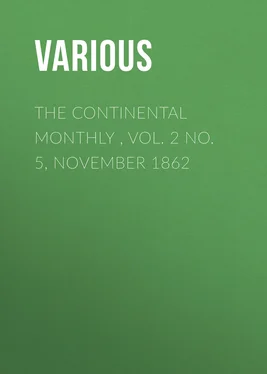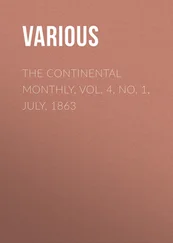Various - The Continental Monthly , Vol. 2 No. 5, November 1862
Здесь есть возможность читать онлайн «Various - The Continental Monthly , Vol. 2 No. 5, November 1862» — ознакомительный отрывок электронной книги совершенно бесплатно, а после прочтения отрывка купить полную версию. В некоторых случаях можно слушать аудио, скачать через торрент в формате fb2 и присутствует краткое содержание. Жанр: foreign_antique, periodic, Языкознание, Политика, foreign_edu, на английском языке. Описание произведения, (предисловие) а так же отзывы посетителей доступны на портале библиотеки ЛибКат.
- Название:The Continental Monthly , Vol. 2 No. 5, November 1862
- Автор:
- Жанр:
- Год:неизвестен
- ISBN:нет данных
- Рейтинг книги:3 / 5. Голосов: 1
-
Избранное:Добавить в избранное
- Отзывы:
-
Ваша оценка:
- 60
- 1
- 2
- 3
- 4
- 5
The Continental Monthly , Vol. 2 No. 5, November 1862: краткое содержание, описание и аннотация
Предлагаем к чтению аннотацию, описание, краткое содержание или предисловие (зависит от того, что написал сам автор книги «The Continental Monthly , Vol. 2 No. 5, November 1862»). Если вы не нашли необходимую информацию о книге — напишите в комментариях, мы постараемся отыскать её.
The Continental Monthly , Vol. 2 No. 5, November 1862 — читать онлайн ознакомительный отрывок
Ниже представлен текст книги, разбитый по страницам. Система сохранения места последней прочитанной страницы, позволяет с удобством читать онлайн бесплатно книгу «The Continental Monthly , Vol. 2 No. 5, November 1862», без необходимости каждый раз заново искать на чём Вы остановились. Поставьте закладку, и сможете в любой момент перейти на страницу, на которой закончили чтение.
Интервал:
Закладка:
This specialité in newspapers has occasionally been ridiculed, though not very well. Dickens's Eatonsville Gazette and Independent are perhaps the best caricatures; and they are a very good embodiment of a particular class of partisan provincial papers; but they are utterly inadequate to characterize the exaggeration that runs riot through the whole tribe of periodicals—and amok through the serried ranks of Anglo-Saxon words. See the New York Rostrum ; daily, weekly, and semi-weekly. It is rampant! It suspects an abuse, and it ramps against it. It seizes an idea, and it ramps toward its development. All who are not with it are against it, and all who are against it are either fools or knaves. The Rostrum never chronicles railroad accidents. Oh, no! It only tells its readers of dastardly and cowardly outrages, committed by blood-thirsty fiends in the shape of presidents and directors against virtuous and estimable passengers, whole hecatombs of whom are assassinated to gratify the hideous appetite for carnage of the officials aforesaid; every one of whom, from the president to the water-boys, ought to suffer the extremest penalty of the law. It doesn't say that they ought to be hung. No! capital punishment was the most benighted characteristic of barbarism. It is a horrid atrocity to bring it down to the present day. Nobody ought to be subjected to it but the slimy reptiles who advocate its continuance.
Not only does the Rostrum behave like a wild bull of Bashan when it is fairly under way, but it is a perfect rocket at starting. It makes haste to commit itself. It is continually entering into bonds to break the peace. Its principle is not unlike that of the Irishman in a row: 'Wherever you see a head, hit it.' It deals around little doses of shillelah, just by way of experiment; and if the unlucky head does not happen to be that of an enemy, make it one; so it's all right again. It carries whole baskets of chips on its shoulders, knock one off who will.
Forgive me, good Rostrum ! I honestly believe thee to be the best paper in this world; and my morning breakfast and car ride would be as fasting and a pilgrimage, without thee! It takes all my philosophy and more than all my piety (besides the lying abed late, and the coffee, which we only have once a week) to dispense with thee on Sunday. No paper is so untrammelled as thou art, for thou hast no shackles but those thou thrustest thine own wrists into; and I prize thee more than a whole sheaf of thy compeers, who always try to decide safely by deciding last. Thou art prompt, brave, and straightforward. In nine cases out of ten, when there are two cages open, thou dashest impetuously into the right one. Verily, thou art a little more headstrong than strong-headed, and a little less long-headed than headlong; but I say, rather let me be occasionally wrong with thee than always mean with some of thy rivals. But why be intemperate in thine advocacy of the nigger question, so overbearing in thine efforts for freedom of speech, or why enslave thyself in the cause of liberty? I could imagine a paper without even thy faults—and for this, I know full well that if thou notice me at all, it will be as a besotted and dangerous old fogy.
To be sure, the Rostrum might be found guilty on other counts of the general crime of word-murder. It has done for the word height by spelling it hight , at the same time giving a supererogatory kick to the good old English participle (already deceased) of the latter orthography. And then, it is not always quite certain whether its events occurred or transpired ! The misapplication of this last word is a shocking abuse of our defenceless mother tongue, and one I have not often seen publicly rebuked. It is not long since I saw the poor dissyllable in question evidently misapplied in the dedication of a book, and on Sunday, not long ago, I heard the pastor of one of the first churches in the city preach of the power directing the events which transpire in this world!
There are two ways of getting public duties attended to; one of which is to advertise for proposals,—a very expensive way; and the other is to get up a public meeting or association, when all men think it an honor to be elected officers for the sake of seeing their names in the papers. Now this last way is the best, in so many respects that it shall be adopted without hesitation for our purposes. Let there be a new Humane Society established, principally for the prevention of cruelty to words, and let the chief officer of the society be so named as to suggest its chief office—that of 'moderator.' And let us hope that as words are the things in question, deeds will abound, as we so well know the truth of the reverse, that where deeds are to be looked for, words prevail amazingly. Outside of its primary beneficent purpose, it may make provision for charities incidental thereunto. It may appoint one committee for the prevention of cruelty to compositors, to examine the chirography of all MSS. about to be 'put in hand,' and, in any case it thinks necessary, return mercilessly the whole scrawled mass to the author to have t's crossed, i's dotted, a's and o's joined at the top, etc., etc. Another privileged three may be merciful to the authors themselves, by providing for the better reading of proofs, by examining and qualifying the readers thereof; a class in this country very deficient, and for a happy reason: namely, that we have not yet a multitude of literary men, very well educated and very poor, who can find nothing better to do. This last committee would find comparatively little occupation, when the previous one had become effective in its line.
To what an illimitable enterprise does the vastness of our plans lead us! Long vistas open before our eyes, with fine prospects for patronage and the gift of many offices. It is at least equal in dignity and grandeur to the city government, and nothing prevents its becoming a vast scheme of corruption, except that it never can, by any possibility, possess a penny of revenue. Of course there should be a committee of repairs and supplies, and one of immigration, the latter to provide for the naturalization of foreign words and their proper treatment before they could take care of themselves; the former for furnishing a supply to meet the growing demand mentioned at the beginning of this article, and for patching up several of the most obvious imperfections we now suffer from. We want a word for the opposite of a compliment . Not that this is as great a defect as the lack of the word compliment would be in these smooth-spoken times, but still the want is felt, and the feeling is shown by such awkward expedients as the expression 'a left-handed compliment.' Then, besides, they might give the seal of legitimacy to a fine lot of words and phrases, the need of which is shown by their being spontaneously invented, and universally adopted by the vulgar; but which are not classic, have never been written except in caricature, and are therefore inadmissible to the writings of us cowardly fellows who 'do' the current literature. For instance: the word onto , to bear the same relation to on and upon , that the word into does to in and within , has no synonyme, and if we had once adopted it, we should be surprised at our own self-denial in having had it so long in our ears without taking it for the use of our mouths and pens.
The judiciary department should have full power to try all defilers of the well of English, be they these offenders we have been talking of—spendthrifts and drunkards in the use of its strong waters—or be they punsters, or be they the latest development of miscreants, the transposers . To the punsters shall be adjudged a perpetual strabismus, that they may look two ways at once, forever—always seeing double with their bodily eyes, as they have been in the habit of doing with their mental ones. Even so to the transposer. Let him be inverted, and hung by the heels till healed of his disorder.
Читать дальшеИнтервал:
Закладка:
Похожие книги на «The Continental Monthly , Vol. 2 No. 5, November 1862»
Представляем Вашему вниманию похожие книги на «The Continental Monthly , Vol. 2 No. 5, November 1862» списком для выбора. Мы отобрали схожую по названию и смыслу литературу в надежде предоставить читателям больше вариантов отыскать новые, интересные, ещё непрочитанные произведения.
Обсуждение, отзывы о книге «The Continental Monthly , Vol. 2 No. 5, November 1862» и просто собственные мнения читателей. Оставьте ваши комментарии, напишите, что Вы думаете о произведении, его смысле или главных героях. Укажите что конкретно понравилось, а что нет, и почему Вы так считаете.












